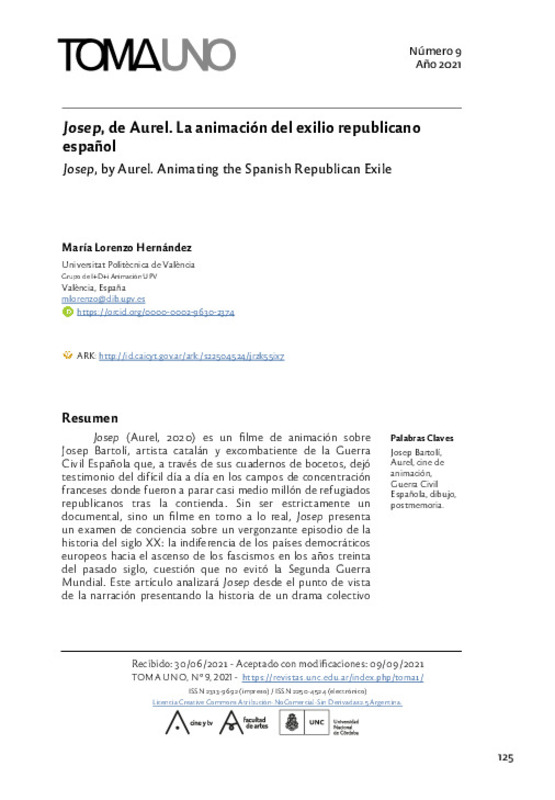JavaScript is disabled for your browser. Some features of this site may not work without it.
Buscar en RiuNet
Listar
Mi cuenta
Estadísticas
Ayuda RiuNet
Admin. UPV
Josep, de Aurel. La animación del exilio republicano español
Mostrar el registro sencillo del ítem
Ficheros en el ítem
| dc.contributor.author | Lorenzo Hernández, María Carmen
|
es_ES |
| dc.date.accessioned | 2022-11-07T19:02:02Z | |
| dc.date.available | 2022-11-07T19:02:02Z | |
| dc.date.issued | 2021 | es_ES |
| dc.identifier.issn | 2250-4524 | es_ES |
| dc.identifier.uri | http://hdl.handle.net/10251/189400 | |
| dc.description.abstract | [EN] Josep (Aurel, 2020), is an animated film about Josep Bartolí, a Catalan artist and ex-combatant of the Spanish Civil War who, through his sketchbooks, left a testimony of the difficult daily life at the French concentration camps where almost half a million Republican refugees were confined. Not strictly a documentary, but a film about the real, Josep examines a shameful episode from the 20th century: the indifference of European democratic countries towards the rise of fascism in the 1930s, which would not prevent the Second World War. This article will analyze Josep from the point of view of the narrative, presenting the story of a collective drama that regains force in the present moment, where the lack of solutions to the great exoduses persists; as well as from the visual and animated point of view, taking into account the dialogue that takes place between Aurel's graphics and Bartolí's, and which is constituted in an artistic animation film thanks to the new digital drawing tools. | es_ES |
| dc.description.abstract | [ES] Josep (Aurel, 2020), es un filme de animación sobre Josep Bartolí, artista catalán y excombatiente de la Guerra Civil Española que, a través de sus cuadernos de bocetos, dejó testimonio del difícil día a día en los campos de concentración franceses donde fueron a parar casi medio millón de refugiados republicanos tras la contienda. Sin ser estrictamente un documental, sino un filme en torno a lo real, Josep presenta un examen de conciencia sobre a un vergonzante episodio de la historia del s. XX: la indiferencia de los países democráticos europeos hacia el ascenso de los fascismos en los años treinta del pasado siglo, lo que no evitaría la Segunda Guerra Mundial. Este artículo analizará Josep desde el punto de vista de la narración, presentando la historia de un drama colectivo que recobra vigencia en el momento presente, donde persiste la falta de soluciones ante los grandes éxodos; así como desde el punto de vista plástico y animado, atendiendo al diálogo que tiene lugar entre la gráfica de Aurel y la de Bartolí, y que se constituye en una película de animación artística gracias a las nuevas herramientas de dibujo digital. | es_ES |
| dc.language | Español | es_ES |
| dc.publisher | Departamento de Cine y Televisión, Facultad de Artes, Universidad Nacional de Córdoba (Argentina) | es_ES |
| dc.relation.ispartof | Toma Uno | es_ES |
| dc.rights | Reconocimiento - No comercial - Sin obra derivada (by-nc-nd) | es_ES |
| dc.subject | Josep Bartolí | es_ES |
| dc.subject | Aurel | es_ES |
| dc.subject | Cine de animación | es_ES |
| dc.subject | Guerra Civil Española | es_ES |
| dc.subject | Dibujo | es_ES |
| dc.subject | Postmemoria | es_ES |
| dc.title | Josep, de Aurel. La animación del exilio republicano español | es_ES |
| dc.type | Artículo | es_ES |
| dc.identifier.doi | 10.55442/tomauno.n9.2021.35783 | es_ES |
| dc.rights.accessRights | Abierto | es_ES |
| dc.description.bibliographicCitation | Lorenzo Hernández, MC. (2021). Josep, de Aurel. La animación del exilio republicano español. Toma Uno. (9):125-141. https://doi.org/10.55442/tomauno.n9.2021.35783 | es_ES |
| dc.description.accrualMethod | S | es_ES |
| dc.relation.publisherversion | https://doi.org/10.55442/tomauno.n9.2021.35783 | es_ES |
| dc.description.upvformatpinicio | 125 | es_ES |
| dc.description.upvformatpfin | 141 | es_ES |
| dc.type.version | info:eu-repo/semantics/publishedVersion | es_ES |
| dc.description.issue | 9 | es_ES |
| dc.relation.pasarela | S\458178 | es_ES |








